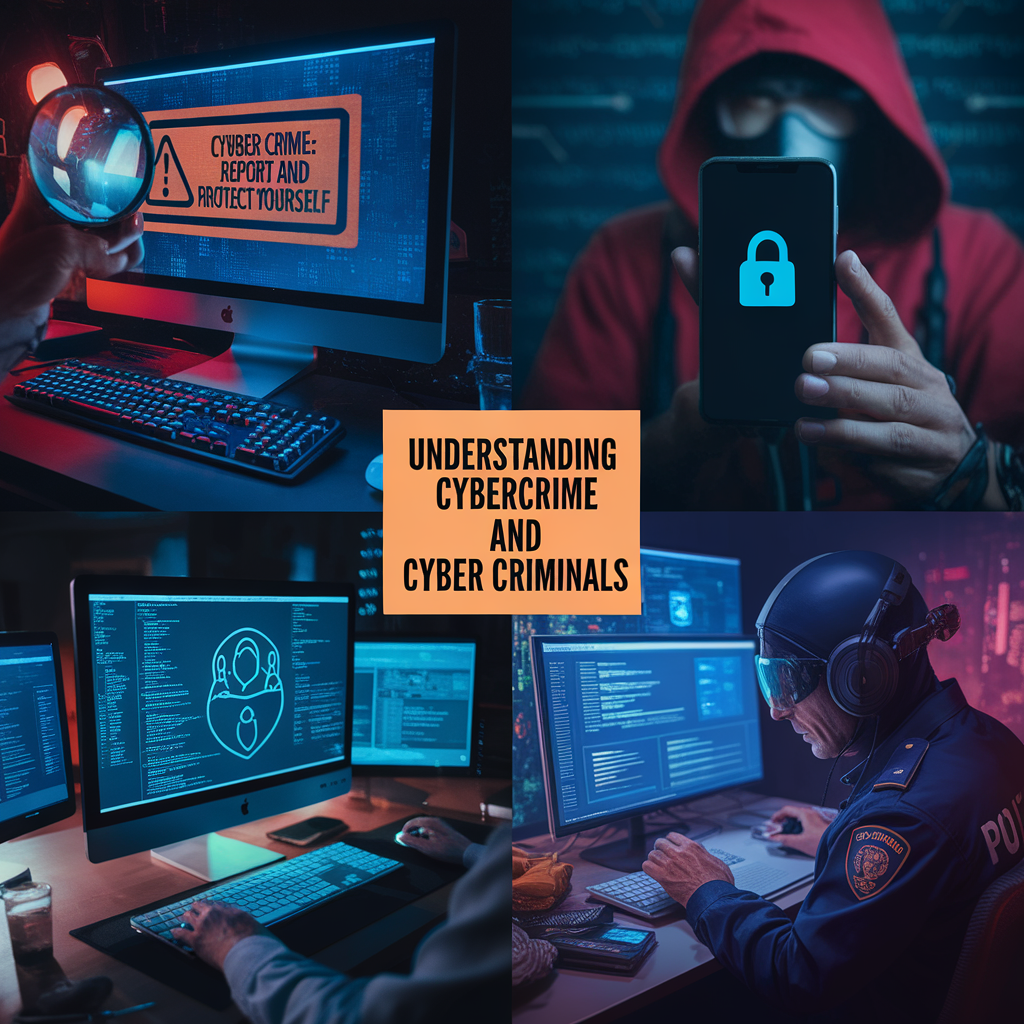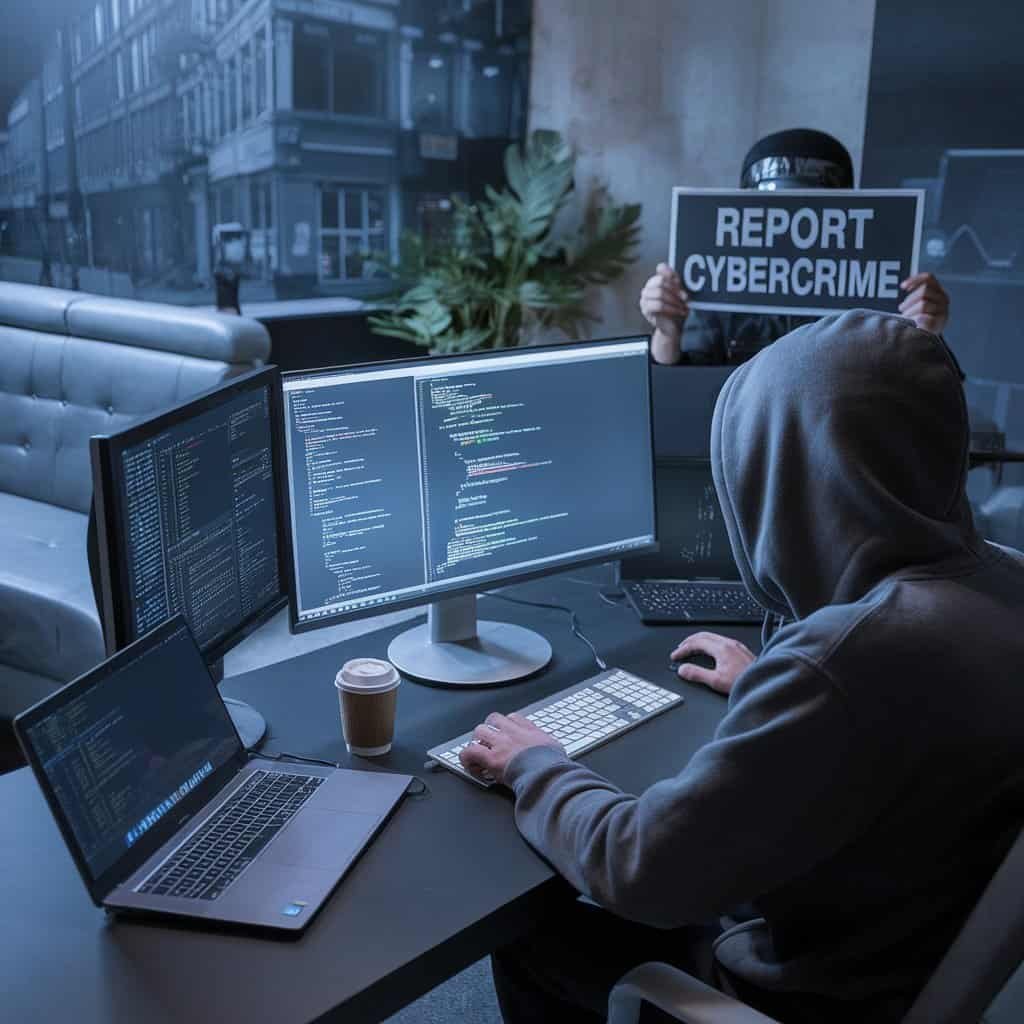Cybercrime: How to Report and Protect Yourself

We may earn a small fee from the companies mentioned in this post.
Need to report cybercrime? This guide covers all you need to know about cybercrime: how to report it, from phishing emails to ransomware. Get the steps and contacts to take action now.
Key Takeaways
Cybercrime can be divided into cyber-dependent crimes, which utilise technology as a tool, and cyber-enabled crimes, which enhance traditional offenses through digital means. Both types of cyber crime pose significant threats.
Reporting cybercrime is essential for reducing digital threats; citizens should contact relevant authorities like Action Fraud and Police Scotland for various types of incidents.
Implementing strong online security measures, such as using password managers and enabling two-factor authentication, is vital for protecting oneself against cybercrime.
Understanding Cybercrime and Cyber Criminals

Cybercrime encompasses offenses committed using digital technology, and it can be broadly categorised into two types: cyber-dependent crimes and cyber-enabled crimes. Cyber-dependent crimes are those that can only be executed through technology, making the devices both the tools and targets of the crime. Think about ransomware attacks that encrypt your data until you pay a ransom, or denial-of-service attacks that flood a network with traffic to make it unavailable. These crimes are inherently technical and require a certain level of expertise to execute.
Cyber crime is a global threat affecting individuals and organisations alike, necessitating collaborative efforts to combat it.
On the other hand, cyber-enabled crimes involve using technology to enhance traditional crimes such as fraud. For instance, phishing schemes that trick individuals into revealing personal information or financial details are classic examples of cyber-enabled crimes. These crimes exploit the internet’s reach and anonymity to amplify their impact, making them more dangerous and widespread.
The legal landscape around cybercrime is defined by acts such as the Computer Misuse Act 1990, which provides legal definitions and consequences for various cyber-dependent crimes. While engaging in cybercrime might seem like a faceless activity, it has real-world repercussions, including severe legal penalties and long-lasting negative implications on a person’s future, including their career prospects.
Moreover, the increasing frequency and sophistication of ransomware attacks pose a significant threat not just to individuals but also to national security and critical infrastructure. Understanding these distinctions and legal ramifications helps recognise the severity and scope of cybercrime.
Awareness is your first line of defence against specific types of cybercrime.
Recognising Cybercrime
Recognising cybercrime is the first step to protect yourself. Among the most notorious forms are ransomware attacks, which involve malicious software that locks users out of their computer or data. These attacks often spread through legitimate-looking emails or websites, tricking users into initiating the infection. Once infected, the ransomware can encrypt data, making it inaccessible until a ransom is paid, and may even threaten to leak sensitive information.
Phishing is another prevalent form of cybercrime. It involves sending deceptive emails that appear to come from trustworthy sources to steal sensitive information. These emails often mimic legitimate entities and can be quite convincing, leading victims to click on malicious links or provide personal details. Scrutinising email addresses, looking for spelling errors, and verifying the legitimacy of requests can help recognize phishing attempts.
Denial of Service (DoS) and Distributed Denial of Service (DDoS) service attack are also common. A DoS attack overwhelms a system’s resources, preventing it from fulfilling legitimate service requests. In a DDoS attack, multiple compromised systems target a single system to disrupt service, making it even more difficult to counteract. These attacks can cripple websites and online services, causing significant disruptions and financial losses.
Understanding these types of cybercrime helps you stay vigilant and better protect yourself. Recognising the signs of cyber attacks and knowing the methods cyber criminals use can significantly reduce your risk of falling victim to these crimes. Recognising the signs of cyber crime is crucial for taking timely action and protecting yourself.
Next, we will explore how to report these incidents to the proper authorities.
How to Report Cybercrime

Reporting cyber crime is critical in combating digital threats. If you encounter any form of cyber crime, report it to Police Scotland by calling 101 for non-emergencies or 999 for emergencies. For cyber fraud or other cyber crime incidents, contact Action Fraud at 0300 123 2040. Provide all relevant details and evidence when making a report to ensure a thorough investigation. After reporting, document the incident and any responses you receive for future reference.
Different types of cyber crime require specific reporting procedures. Let’s delve into how to report suspicious emails and text messages, ransomware attacks, and Business Email Compromise (BEC).
Reporting Suspicious Emails and Text Messages
Suspicious emails and suspicious text messages are common tactics used by cybercriminals to initiate cyber attacks. If you receive a suspicious text message, forward it to 7726, a service specifically designed to handle such reports. For suspicious emails, forward them to the Suspicious Email Reporting Service (SERS). Reporting these messages is crucial in combating cyber crime, as it helps authorities track and mitigate potential threats.
Always exercise caution when dealing with unsolicited communications. Verify the source before clicking on any links or providing personal information. Staying alert and reporting suspicious activity enhances cybersecurity for everyone. Remember to verify you are human and uk verify any unfamiliar requests.
Reporting Ransomware and Malicious Software Attacks
If you fall victim to a ransomware attack, the first step is to contact Police Scotland on 101. Seek help from initiatives like No More Ransom, which can assist in unlocking your device without paying the ransom. Avoid copying data from the infected device, as this can hinder recovery efforts. Law enforcement agencies do not support paying ransom demands as it does not ensure data recovery and encourages further cyber crime.
Respond quickly and calmly to mitigate the impact of the attack. Document all details of the attack, including any ransom demands and the affected data, and forward this information to the authorities. Taking these steps helps law enforcement track down cyber criminals and prevent future attacks.
Reporting Business Email Compromise (BEC)
Business Email Compromise (BEC) is a form of phishing attack targeting senior executives to trick them into transferring funds or revealing sensitive information. If your business falls victim to a BEC attack, report the incident to the appropriate authorities immediately. Suspicious emails requesting unusual payments or containing links to malicious websites should be scrutinized and reported.
All organizations, regardless of size, are at risk from BEC attacks. By reporting these incidents, you help protect your business and contribute to broader efforts to combat cyber crime.
Protecting Your Online Security

Online security is paramount in today’s digital age. Use a password manager to generate and store secure passwords. Creating passwords with three random words makes them challenging to break. Use a unique email password different from other accounts to enhance protection against identity theft.
Two-factor authentication (2FA) adds an extra layer of security to prevent unauthorized access to your accounts. Regularly downloading software and app updates is essential for safeguarding your devices from cyber threats. Backing up important data to an external drive or cloud storage can help you recover quickly in case of a cyber attack.
Review the security of your connection before proceeding with any online transactions or sharing personal details in a place online. Taking proactive steps significantly reduces the risk of falling victim to cyber crime and ensures the security of your online presence.
Cybersecurity Resources

Numerous resources are available to help you stay safe online. The National Cyber Security Centre (NCSC) supports critical national infrastructure and the public in improving their cybersecurity measures. The NCSC provides advice and guidance to prevent ransomware attacks and enhance online security. The Cyber Aware initiative offers government advice on how to stay secure online, including tips on passwords and two-factor authentication.
The Cyber Choices program aims to prevent young people from engaging in cybercrime by providing educational resources. Cyber Scotland offers tailored resources for various sectors, helping individuals and organisations stay secure in the digital landscape. These resources help protect your computer systems and mitigate security vulnerabilities. These resources are invaluable in the fight against cyber crime.
The Role of Law Enforcement in Combating Cybercrime

Law enforcement plays a crucial role in combating cyber crime. The National Crime Agency (NCA) emphasizes the importance of international collaboration due to the global nature of cybercrime. The NCA collaborates with international law enforcement agencies like Europol and the FBI to tackle cybercrime on a global scale. Their approach focuses on critical cyber incidents and long-term activities against cybercriminals and enablers.
The NCA breaks down the cybercrime ecosystem into five pillars to better target criminal activities. You can report cybercrime anonymously through Crimestoppers, contributing to broader law enforcement efforts. Understanding law enforcement’s role helps appreciate the complexity and scale of efforts required to combat digital threats.
Summary
In summary, cyber crime is a pervasive threat that requires vigilance and proactive measures to combat. Understanding the different types of cyber crime, recognising their signs, and knowing how to report incidents are crucial steps in protecting yourself and your organization. Utilize available cybersecurity resources and take preventive measures to safeguard your online presence.
By staying informed and alert, you can significantly reduce your risk of falling victim to cyber crime. Remember, every report and preventive action contributes to a safer digital world for everyone.
Frequently Asked Questions
What is the difference between cyber-dependent and cyber-enabled crimes?
Cyber-dependent crimes are those that can only occur through the use of technology, whereas cyber-enabled crimes utilise technology to facilitate or amplify traditional criminal activities. This distinction is crucial for understanding the varied impact of cyber threats.
How can I report a suspicious email?
To report a suspicious email, you should forward it to the Suspicious Email Reporting Service (SERS). This helps authorities in addressing potential threats effectively.
Should I pay the ransom if I’m a victim of a ransomware attack?
It is strongly advised not to pay the ransom in a ransomware attack, as doing so does not guarantee data recovery and may encourage future criminal activities. Instead, consider reporting the incident to law enforcement and seeking professional cybersecurity assistance.
What is two-factor authentication (2FA)?
Two-factor authentication (2FA) enhances account security by requiring a second form of verification, such as a text message or authenticator app, alongside your password. This additional step significantly reduces the risk of unauthorized access.
Where can I find resources to improve my cybersecurity?
You can find valuable resources to improve your cybersecurity at the National Cyber Security Centre (NCSC), the Cyber Aware initiative, and Cyber Scotland. These organisations provide guidance and tools tailored to enhance your online security.
Useful Informative Websites
- National Cyber Security Centre (NCSC)
- Website: ncsc.gov.uk
- Description: Operated by the UK government, the NCSC offers guidance on how individuals and organisations can protect themselves from cyber threats. It includes resources on a wide range of topics, from securing devices to dealing with phishing attacks.
- Action Fraud
- Website: actionfraud.police.uk
- Description: The UK’s national reporting center for fraud and cybercrime. Action Fraud provides information on current scams and advice on how to avoid them, as well as a platform for reporting fraud and cybercrime incidents.
- Information Commissioner’s Office (ICO)
- Website: ico.org.uk
- Description: The ICO is the UK’s independent body set up to uphold information rights. Its website includes guidance on data protection and privacy matters, which are crucial for cybersecurity.
- Citizens Advice
- Website: citizensadvice.org.uk
- Description: While not exclusively focused on cybersecurity, Citizens Advice offers guidance on how to deal with, and report, various types of scams and frauds, including those online.
With over three decades of experience in the heart of London’s financial sector, I have dedicated my career to the pursuit of robust cybersecurity practices and IT leadership. As a Certified Information Systems Security Professional (CISSP), Certified Information Security Manager (CISM), Certified Chief Information Security Officer (C|CISO), Certified Ethical Hacker (CEH), and Computer Hacking Forensic Investigator (CHFI), I bring a wealth of knowledge and expertise to the table.
My journey in the field of cybersecurity has not only been about personal growth but also about sharing my insights with others. As an international speaker, I have had the privilege of addressing audiences worldwide, discussing the importance of cybersecurity in today’s digital age. My passion for knowledge sharing extends to my work as an author and blogger, where I delve into the complexities of cybersecurity, offering practical advice and thought leadership.
In my role as a CISO and Head of IT, I have overseen the development and implementation of comprehensive information security and IT strategies. My focus has always been on creating resilient systems capable of withstanding the evolving landscape of cyber threats.
My Master’s degree in Cybersecurity has provided a solid academic foundation, which, when combined with my practical experience, allows me to approach cybersecurity from a holistic perspective.
I am always open to connecting with other professionals in the field, sharing knowledge, and exploring new opportunities. Let’s secure the digital world together.

